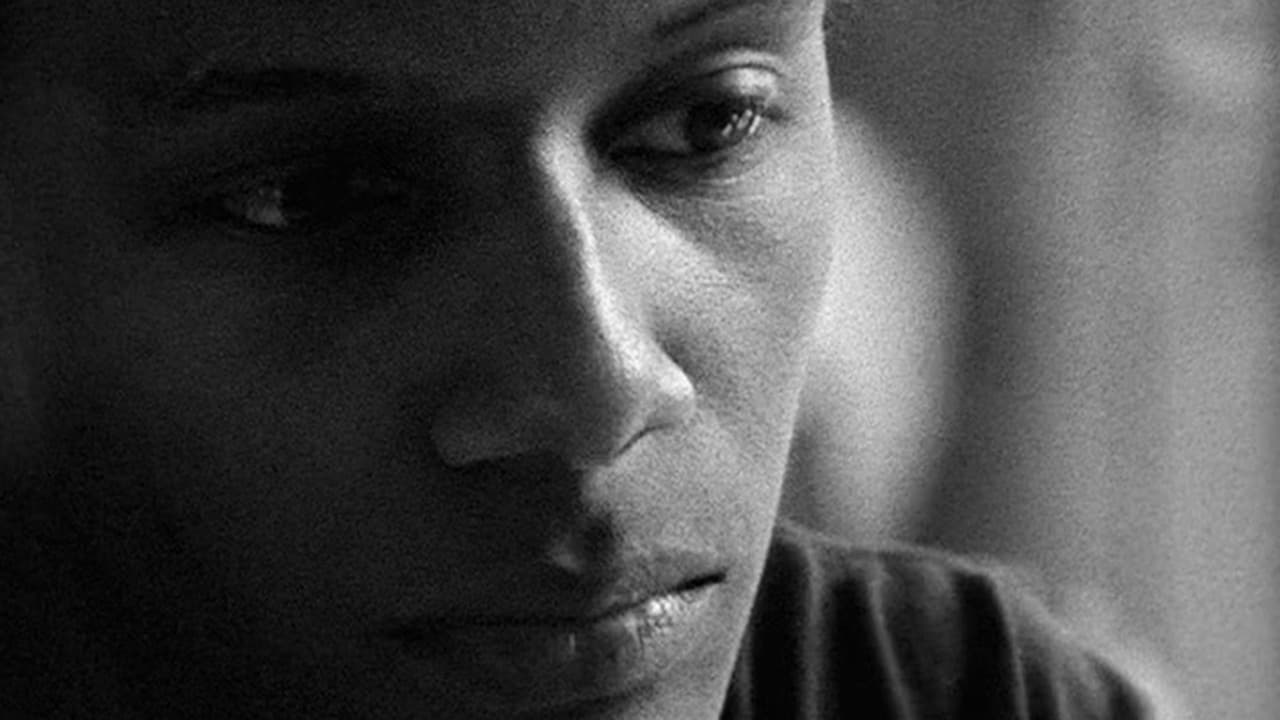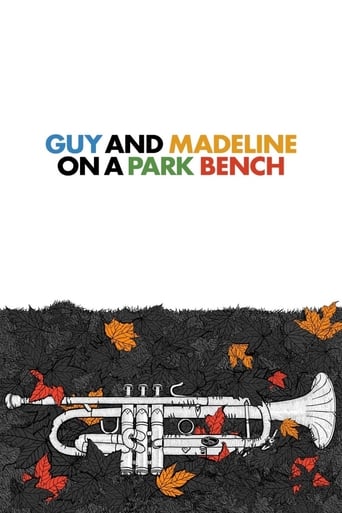

It gives me great hope as a director to know that Damien Chazelle went from ... This... To an amazing film like La La Land in only 7 years. An impressive improvement. The music for this film was definitely the strong point, with some numbers working well. But the attempt at the realistic dialogue was unfortunately ruined by the actors. This film felt like it was trying so hard to be so unique, yet it seemed like the movie had confidence issues.
... View MoreIt seems unfair to review this film for the simple reason that it didn't start as a work that was looking for theatrical distribution; like Scorsese before him with Who's That Knocking at my Door, Damien Chazelle made Guy and Madeline on a Park Bench as a student film, and probably due to some encouragement submitted it to some festivals and got in, most notably to Tribeca and AFI.I have to wonder if he was surprised by that since, frankly, this movie is a mess. However this is also the kind of mess that is filled with passion, and a few truly wonderful scenes, so it's hard to really evaluate it unless not even so much if I put on my critics hat but if I put on my film professor hat; writing a review of this is akin to writing down marks on a paper and submitting a letter grade (in this case it would be near a B- or C+).The movie doesn't lack heart and a somewhat unique way of taking a genre film, for Chazelle the musical in his first three outings is all (I feel like there's sort of a career trajectory with Tarantino, whether unintentional or not, and one can see this in a more forgiving light as like Chazelle's My Best Friend's Birthday - clearly enough elements here will work there way into La La Land as that film had parts that would be retrofitted for True Romance).This is shot in 16mm at a time when digital movie-making is at least seemingly much simpler. He goes back into the realm of super-duper cinema verite, as he operates the camera himself and so much of the film feels improvised that I'm nearly surprised there's a script credit. Moments just happen here, like when Madeline (or is it the other woman, Elena) gets asked by a stranger to buy some flowers, or another stranger, some old cop, keeps pestering here like a borderline (or just) cat-caller and she comes up to his place for no reason AT ALL.There is barely a story here. We don't know why Guy and Madeline are together, and often they're seen apart in this story. As with everything else here, things just happen without much concern for any development or character arcs or things that go into the *story* of the film. We do see them sort of argue at one point - she is woken up early one morning as he's practicing, he asks her to hear something he's written, she's walked out of the room back into bed, he annoys her with playing right up to her ear, and... why is this happening? What did they do to grow apart? It's basically like in Guy and Madeline on a Park Bench Chazelle got so much right, or at least was daring in experimenting in a blend of Cassavetes-Shadows-era improvisational filmmaking with his un-abiding love of musicals (credit must also be due to Justin Hurwitz as composer and lyricist, damn is he good), that he either forgot or intentionally neglected the things that keep us (or at least could keep me) engaged past the various shots of characters walking around a city or playing alone in a room or at a party, like giving us likable people or anything that relates back to a start and end for these people. Compared to this, Shadows is chock-full of incident.So it it does fail or at least falter when it comes to basic storytelling and giving us interesting characters, I do appreciate and love when it breaks out into its musical numbers; if this had been a short film with Madeline singing "Boy in the Park" and doing a dance number, I would say it's great, and you can check that one section on Youtube currently and see what I mean. This is overall so tedious and at the same time fascinating, and, again, I almost feel bad giving it the rating and review I am. Artists like Chazelle need to be encouraged when they're starting out, and clearly the festival run and (small) release by Film Movement did just that. So as a start to what now seems to be one of the strongest careers for a young filmmaker in this industry, more power to him. But there IS a reason we don't return to watch most student films, you know?
... View MoreWho would've thought director Damien Chazelle, following his low-key, festival-success with Guy and Madeline on a Park Bench, would go on to be something of a hot commodity in the film world just five years later with the release of his sophomore effort Whiplash, meriting several Oscar nominations and wins and a whirlwind of positive buzz? To say Guy and Madeline on a Park Bench is a different film from Whiplash is an understatement. While I obviously did not go into this film expecting to see a film similar in style or quality to Whiplash, judging simply by the plot and the poster, I think it's worth noting that I'm not particularly sure both of these films exist in the same universe together. I highly doubt there's anything resembling a Terence Fletcher in the whimsical world of Guy and Madeline.The film takes place in Boston, centering on the titular characters (Jason Palmer and Desiree Garcia, respectively), who've been dating for about three months. Guy is a jazz trumpeter, obtaining whatever work he can get in jazz clubs or underground subways, just to make end's meet, and Madeline is an introverted soul who can't seem to find any kind of work. The immediate shock of meeting one another and falling in love has faded for both of them, to say the least, as Guy is now pursuing the likes of Elena (Sandha Khin), a more adventurous soul with a more outgoing personality. This leaves Madeline out tremendously, to which she responds by trying to get her own life on track with a new boyfriend whilst Guy continues to play his nightclubs and make a living as a jazz musician.Guy and Madeline on a Park Bench is like a cross between contemporary mumblecore filmmaking and the classic, Hollywood musicals of the 1950's, which featured enough whimsy and warmth for an entire franchise. Chazelle employs the directorial style of shooting close to the subjects, using extreme close ups or traditional close ups in order to presumably conjure intimacy within its subjects. Combine this with the grainy black and white cinematography and method of shooting and you have a film that's more enjoyable as an exercise in style than anything else. The aforementioned qualities that seem to be extracted from 1950's Hollywood musicals, however, poses a nice change in pace for the mumblecore style, rather than the traditional band of twentysomethings talking and rambling about their existence and their lives in closed, tight-knit settings like lofts and apartments.It seems whenever the genre of mumblecore - and by "mumblecore," I mean the cinematic subgenre/style of shooting with lower budgets, low-quality cameras, amateur actors, and an emphasis on naturalistic writing and acting, traditionally by way of improvisation - decides to increase its playing field by pursuing genres such as musicals and horror films that they're mostly enjoyable as stylistic exercises and little else. Mumblecore is such a difficult subject to explain, and, more often, recommend, because its ability to be likable starts and ends with the focus it puts on its characters and the qualities of their personalities. If you have a film of the genre with lackluster characters that don't do much else other than lackadaisically converse and don't exchange anything of noteworthy insight or ideas, than you have a film that's fairly stagnant in its likability.That's more or less what happens with Guy and Madeline on a Park Bench; the actors here are uniformly capable and Chazelle's close ups along with self-executed cinematography make for a film that takes on a new life all its own in terms of look, feel, and mood. However, in the process, there's little to no character or philosophical development for the film's titular characters, leaving them lost in the shuffle while the environment and the film's own atmosphere engulf them entirely. What we have here, again, is another mumblecore film that is much more intriguing to speak about and discuss rather than actually view.Starring: Jordan Palmer, Desiree Garcia, and Sandha Khin. Directed by: Damien Chazelle.
... View MoreShot in black and white on a hand-held 35 mm DXL Supreme MP, Guy and Madeline on a Park Bench is a period piece without a period, a beautiful glimpse into a world without beauty, a heart-rending portrayal of the heartless. The film swings (no pun intended :)!!) between tortured silences and undistilled brassy mirth, with a fantastic debut performance from trumpeter and lead man Jason Palmer.Chazelle's entrance onto the scene is nothing short of momentous, an omen of good things to come in a struggling industry. He brings art and subtlety back to a genre that has recent been diluted by big Oscar grabs (Chicago, Dreamgirls, Cadillac Records) and will be sure to make an impression at Tribeca.This film would be a perfect ten, were it not for Bernard Chazelle's somewhat tepid makeout scene. Go for it, man! When else will you find yourself with a beautiful and eager girl half your age ... on camera?! Other than this one shortcoming, which will be sure to draw a few tsk-tsks from the monocled section at Tribeca, the film is FLAWLESS.Bravo.
... View More